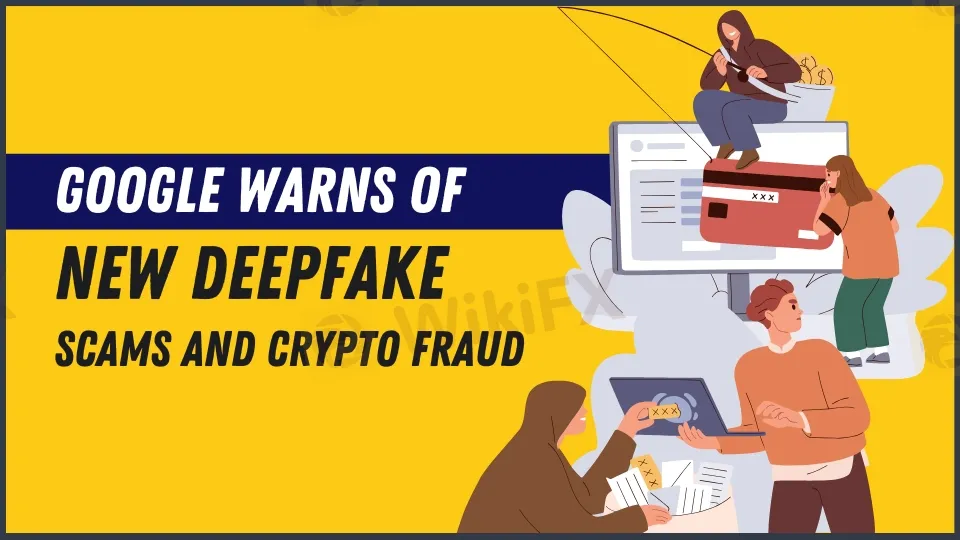简体中文
繁體中文
English
Pусский
日本語
ภาษาไทย
Tiếng Việt
Bahasa Indonesia
Español
हिन्दी
Filippiiniläinen
Français
Deutsch
Português
Türkçe
한국어
العربية
Google Warns of New Deepfake Scams and Crypto Fraud
Abstract:Google exposes deepfake scams, crypto fraud, and app cloning trends. Learn how to spot these threats and safeguard your data with expert tips and advice.

Google has revealed a proactive campaign to combat the rising menace of online frauds, which have attained unparalleled levels of complexity and popularity. The internet giant's Trust & Safety teams will issue frequent warnings to educate consumers about developing fraud strategies and provide them with the tools they need to defend themselves.
Google launched the program in response to five disturbing fraud patterns it detected. Scammers are using powerful deepfake technology to generate convincing counterfeit material, and prominent figure impersonation schemes are at the forefront. These impersonations often pitch false high-yield investments, freebies, and malicious software, combining old fraud techniques with cutting-edge technology.
Google warns about cryptocurrency fraud as well. These frauds often offer excessively large profits while fraudulently associating with well-known businesses or people. “Be wary of investments that promise assured or high returns with little to no risk. Google warned: ”If it sounds too good to be true, it probably is.

Cloning apps and websites is another false practice. Scammers construct near-identical copies of legal platforms in order to deceive customers into supplying personal information or making unlawful transactions. To prevent becoming a victim, Google urges users to double-check URLs and landing sites.
Deceptive cloaking techniques have also raised concerns. Scammers hide fake material in order to avoid Google's detection algorithms while providing consumers with incorrect information. For extra protection, the organization suggests turning on Enhanced Protection in Chrome.
Furthermore, malevolent actors use important events like elections and natural catastrophes to create fake campaigns that take advantage of the increased public attention. Google advises users to stay careful at such periods and to double-check the legitimacy of internet claims.
CICC Warns Filipinos of Rising Crypto Scams and Fraud Tactics
The Cybercrime Investigation and Coordinating Center (CICC) in the Philippines has observed an increase in cryptocurrency fraud. According to CICC Executive Director Alexander Ramos, the organization has received complaints from 14 victims who were duped into investing between $100 and $1,000 by overseas fraudsters. These frauds often instill a false feeling of urgency in victims, pressuring them to make snap judgments. The crooks vanish without a trace after transferring the money.Final ThoughtsThe proliferation of internet frauds necessitates a collaborative effort by technology firms, regulators, and consumers. While Google's endeavor is an important start in combatting these risks, public knowledge and vigilance remain the most effective defenses. Individuals may defend themselves against developing fraud methods by being aware and careful.

Disclaimer:
The views in this article only represent the author's personal views, and do not constitute investment advice on this platform. This platform does not guarantee the accuracy, completeness and timeliness of the information in the article, and will not be liable for any loss caused by the use of or reliance on the information in the article.
Read more

Malaysian-Thai Fraud Syndicate Dismantled, Millions in Losses Reported
The Royal Malaysia Police (PDRM) has received 26 reports concerning the Nicshare and CommonApps investment schemes, both linked to a major fraudulent syndicate led by a Malaysian citizen. The syndicate’s activities came to light following the arrest of its leader by Thai authorities on 16 December.

Malaysian Pensioner Loses RM823,000 in Fake Investment Scam
A 61-year-old man from Batu Pahat, Malaysia, has fallen victim to a fraudulent investment scheme, losing a staggering RM823,000. Local authorities revealed that the man was lured through a Facebook advertisement promoting an investment opportunity with promises of substantial returns.

SEC Approves Hashdex and Franklin Crypto ETFs on Nasdaq
The SEC has approved crypto index ETFs by Hashdex and Franklin Templeton, including Bitcoin and Ethereum, marking a milestone in crypto asset investment.

North Korean Hackers Steal $1.3bn in Cryptocurrency in 2024
Over $2.2bn in cryptocurrency stolen in 2024, with North Korean hackers accounting for $1.3bn. Discover how cyber theft impacts the evolving crypto landscape.
WikiFX Broker
Latest News
ASIC Sues Binance Australia Derivatives for Misclassifying Retail Clients
Geopolitical Events: What They Are & Their Impact?
Top 10 Trading Indicators Every Forex Trader Should Know
WikiFX Review: Is FxPro Reliable?
Trading frauds topped the list of scams in India- Report Reveals
Malaysian-Thai Fraud Syndicate Dismantled, Millions in Losses Reported
Why Do You Feel Scared During Trade Execution?
Revolut Leads UK Neobanks in the Digital Banking Revolution
Fusion Markets: Safe Choice or Scam to Avoid?
SEC Approves Hashdex and Franklin Crypto ETFs on Nasdaq
Currency Calculator


